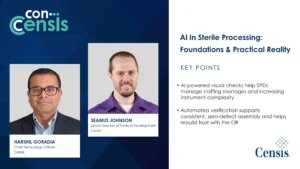Big Tech is Helping Healthcare Organizations Recover Profit Loss
In a call of recruitment, Greg Ryan first learned of his job in a simple pitch: to help doctors save lives. Now as a Principal Solutions Engineer in the healthcare unit at Salesforce, Ryan knows how true that pitch rings. Ryan joined Highway to Health host David Kemp to discuss his critical role at Salesforce and how the process company is changing up the healthcare industry.
Unlike the name, the Salesforce healthcare unit does not sell things, in fact, they process them.
Often, doctors visits require an hour or maybe even two to schedule out of the day, with paperwork, travel time, and more blocking valuable facetime with the healthcare professional. Ryan’s experience in a clinical setting was different, coming in and out in 15 minutes or less. This sparked the question: how is the ease of this clinic visit possible when GP visits are more than twice the time?
“It’s because…the service that they’re providing is a product. And they’re going to get paid x amount of dollars for that product, so the only way for them to increase their profitability is to have more people coming through the system,” explained Ryan. While most clinic facilities take insurance (meaning the price is the same between clinic and GP), the time it takes to see a doctor and have a visit is significantly improved.
“They’re process-minded,” said Ryan about the clinic, which is why Salesforce entering the healthcare industry is important, as processing comes naturally to them.
Whenever an appointment is missed in a healthcare setting, that accounts for revenue loss on the part of the healthcare provider. Ryan knows this must be mitigated and the Salesforce healthcare unit aims to help remind people of their appointments and their healthcare needs via messages and phone calls, optimizing the process “in any sort of way that these organizations want to engage with their patients.”








